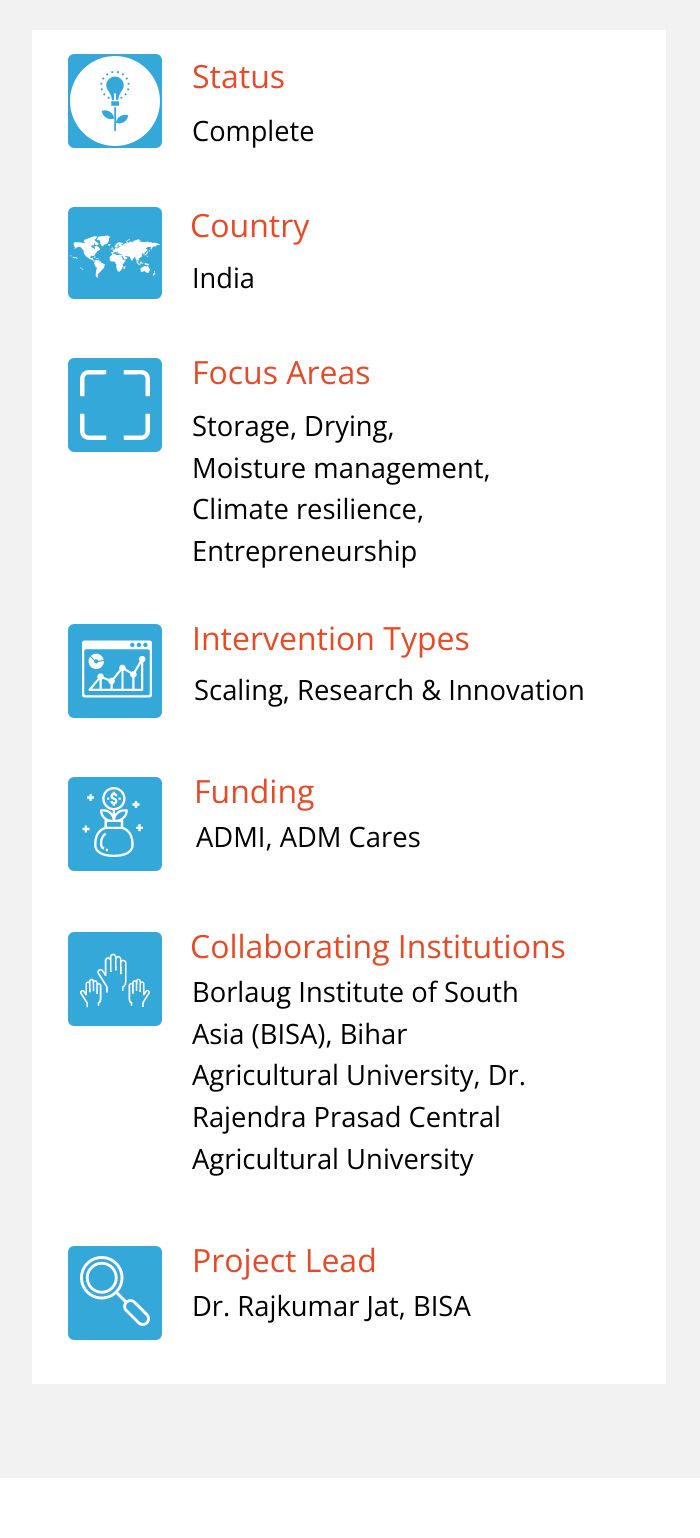Integrating Postharvest Technologies into ‘Scaling up Climate Smart Agriculture (CSA) through Mainstreaming Climate Smart Villages (CSVs) in Bihar’
Background
The ‘Scaling up Climate-Smart Agriculture through Mainstreaming Climate-Smart Villages (CSVs)’ is a Government of Bihar project implemented by the Borlaug Institute for South Asia (BISA), the International Maize and Wheat Improvement Center (CIMMYT), Indian Council for Agricultural Research, Dr. Rajendra Prasad Central Agricultural University (DRPCAU), and Bihar Agricultural University (BAU). The project focuses on improving the adaptive capacity of rural communities to climate change through the promotion of sustainable and climate resilient agricultural practices such as conservation agriculture, cropping system diversification, and capacity building among other things.
Climate change not only brings challenges to farm production but also exacerbates problems of postharvest loss. ADMI provides supplemental resources to enable the program to provide postharvest technologies and information to build climate resilience among smallholders in Bihar.
Project Information
The ADMI-CSV project works in eight districts in Bihar within four agro-climatic corridors – Purnea-Katihar, Darbhanga-Samastipur, Patna-Nalanda and Munger-Sheikhpura with 25 villages per corridor leading to a total of 100 villages. The CSVs raise farmer awareness on climate change adaptation through community-based training approaches. The project is led by BISA in collaboration with the Bihar Agricultural University (BAU) and Dr. Rajendra Prasad Central Agricultural University (DRPCAU) who lead project activities in their respective corridors. This project is a follow-on to the earlier ADMI Village (2012-2016) project that created a powerful evidence base on the benefits of hermetic storage for smallholder households.
The CSV project focuses on three objectives to provide postharvest technologies and information to build climate resilience among farmers in Bihar:
- Provision of grain dryers and enabling entrepreneur-led drying services
- Subsidized distribution of grain storage bags leading to a sustained distribution system through local entrepreneurs
- Deploying trainers to provide information and training to service providers on postharvest practices and technologies
Project Progress
The project utilizes community-based field investigators (FIs) as local trainers. Each of the three partner institutions works with four to six field investigators, who are responsible for each of the corridors. The FIs work closely on a day-to-day basis with farmers to provide technical assistance on using hermetic bags, storing grain, drying grain and other topics as requested. Field investigators also use technology, including WhatsApp groups, to provide additional services to farmers when face-to-face contact is impossible.
Farmer feedback and technical observations have motivated researchers based at BAU and DRPCAU to engage with Bangladesh Agricultural University about performance and efficiency issues with the STR dryer. Modifications and lab testing on these small-scale dryers to address local needs are currently underway.
BISA, BAU, DRPCAU have worked to make the evidence on the effectiveness of hermetic bags known to policy makers and a recent policy intervention promises facilitate wider adoption of improved storage. In late 2019, the Government of Bihar announced a 50% subsidy for hermetic bags. This policy will make the bags affordable for farmers and attractive for retailers, and contribute to the growth of a viable market for hermetic storage technologies in Bihar.
Response to COVID-19
COVID-19 disrupted food supply chains, which created new challenges for postharvest grain management in Bihar, and also impeded getting face-to-face support from PIs. At the same time, COVID-19 lockdowns triggered increased uptake of digital mobile platforms.
In response, Vishal Kumar helped launch multiple farmer WhatsApp groups near the Pusa corridor for CSV farmers in Gopalpur, Dhruvgama, and Ladaura villages. Participants in these WhatsApp groups were extremely active, sharing pictures of how farmers were using the hermetic bags, noting the quality of grain in storage, and using the STR dryer for drying wheat grains. Farmers also used the WhatsApp groups to request FI visits and provide extension advice, or request additional hermetic bags for grain storage. WhatsApp groups are allowed more feedback from farmers, as well as a means to share knowledge with them.
Farmer feedback and technical observations motivated researchers based at BAU and DRPCAU to engage with Bangladesh Agricultural University about performance and efficiency issues with the STR dryer. Modifications and lab testing on these small-scale dryers to address local needs were carried out. The project concluded at the end of 2020.
Key Accomplishments
- 62 village trainings
- 2,846 postharvest trainees, including 1,086 women
- 12 information fairs (kisan ghostis)
- 7,026 bags distributed to 2,818 farmer households
- Knowledge and outreach products including flyers created and distributed
- 20 field investigators providing training and extension services



